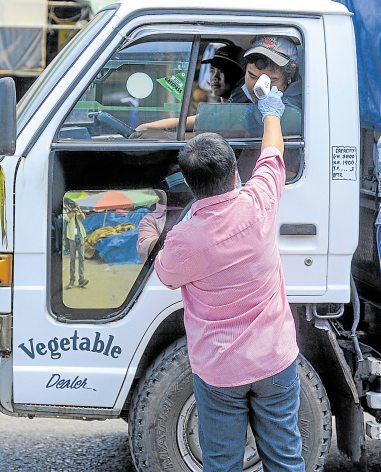Special lanes for cargo set after traders hit varying rules

TEMPERATURE CHECK Vegetable haulers stop at a checkpoint in La Trinidad, Benguet province, for a temperature check on Tuesday. Police turn around haulers coming to Benguet to pick up vegetables because their trucks are empty. —KARLSTON LAPNITEN
MANILA, Philippines — All types of cargo must be able to move unimpeded during the quarantine of Luzon, and special lanes have been designated for them along major highways, officials said on Wednesday amid reports that police were turning around food trucks at checkpoints, threatening the food supply in Metro Manila.
Cabinet Secretary Karlo Nograles said the Philippine National Police had been directed to allow the unimpeded movement of all types of cargo, but officers could inspect these at checkpoints to ensure that strict home quarantine protocols were observed.
Trade Secretary Ramon Lopez said the unimpeded movement of cargo was allowed to make sure supermarket shelves would be replenished.
The Department of Agriculture (DA) released new guidelines for local governments and law enforcers following complaints from traders and haulers about problems at checkpoints.
Enough food supply
President Rodrigo Duterte on Monday placed the entire island of Luzon on quarantine to halt the spread of the new coronavirus in the Philippines. He said he approved the restrictions because a quarantine imposed on Sunday on Metro Manila was riddled with exemptions that failed to keep people away from one another.
Article continues after this advertisementGovernment officials assured the public there would be enough supply of food during what the administration called “enhanced community quarantine.” (See related story in Regions, Page A5.)But more than 50 trucks that were to pick up vegetables in Benguet province were refused passage by policemen at a checkpoint in Sison, Pangasinan, on Tuesday, delaying delivery of produce to markets in Metro Manila.
Article continues after this advertisement“We have to rent trucks [in Benguet because] our trucks were sent back for being empty. Police manning the checkpoints said this was their regulation,” said Gilbert Santos (not his real name), a vegetable trader in La Trinidad, Benguet.
“We considered a possible remedy if empty trucks would not be allowed to come up here. We may arrange for a transfer in Sison, where empty trucks will wait at the border for those coming from La Trinidad,” he said.
But for most traders, he said, the proposal means delayed delivery and additional costs.
About a hundred haulers who deliver live chickens to a dressing plant in Batangas province also encountered problems on Tuesday. The chickens, once butchered, are delivered to big food companies in Metro Manila, including fast-food chains.
The deliveries are considered essential under quarantine rules, but the haulers said police at the checkpoints refused to allow them through because they were not carrying live chickens.
The haulers had to ask the DA for help to get through.
“Maybe the police had different orders,” a food company official said.
Farm inputs ‘not food’
“If all haulers have to explain themselves, and even get an agency to intervene, then the traffic would really be bad,” he said.
Bong Inciong, president of United Broiler Raisers Association, said some of the group’s members were stopped at checkpoints, forcing them to cancel deliveries.
Others that were delivering farm inputs like animal feed and fertilizer were also refused passage because the police did not consider farm inputs food.
There were also reports that truckers who were returning to the provinces after delivering their goods were stopped at checkpoints for “not carrying any agricultural commodities,” which showed lack of coordination between the government and the police.
There was also a question of what kind of cargoes are considered essentials, apart from food and medicine. Many products fall under the category essential, but not deemed important until these run out.
This was the problem of a distributor from Quezon province. Before the quarantine, he delivered a thousand 200-liter drums to Metro Manila every day for filling at gas stations then delivered to the military. But he was refused entry into Metro Manila on Tuesday because he wasn’t carrying essentials.
“They don’t understand.They only let through food and medicine,” the distributor said.
Separate lanes
The PNP had no immediate comment on the reports on Wednesday. But Brig. Gen. Bernard Banac, spokesperson for the PNP, said at a televised briefing that separate lanes had been designated for vehicles delivering agricultural products at the North Luzon Expressway and South Luzon Expressway.
Separate lanes would also be set up on other thoroughfares, Banac said.
“This way, there would no longer be undue delays to the transportation of goods and other agricultural products [to] Metro Manila,” he said.
Nograles, spokesperson for the Inter-Agency Task Force for the Management of Emerging Infectious Diseases, said the order for the unhampered movement of cargo applied to shipments entering and leaving the country’s ports.
“Our cargo should be free-flowing. Whatever we need to do to speed up the release of cargo, especially the ports, we need to do that,” he said.
If there is a problem in the Bureau of Customs, it has to be dealt with along with other bottlenecks.
Meanwhile, the Department of Transportation, in coordination with the local governments and the Department of Health, should develop a system of point-to-point transport service for health workers, Nograles said.
He said such a system would help health workers report for work despite the shutdown of public transportation.
As for other workers, Nograles said the government was asking employers to provide transportation for them.
Opposition senators said food manufacturers and distributors should be allowed use of marks on their delivery vehicles that would allow clearance at checkpoints.
“The best way to counter panic buying in these times is to show [shelves full of food],” Senators Franklin Drilon, Francis Pangilinan, Risa Hontiveros and Leila de Lima said in a joint statement. —WITH REPORTS FROM KIMBERLIE QUITASOL, KARLSTON LAPNITEN, ROY STEPHEN C. CANIVEL, KARL R. OCAMPO, JEANNETTE I. ANDRADE AND MARLON RAMOS